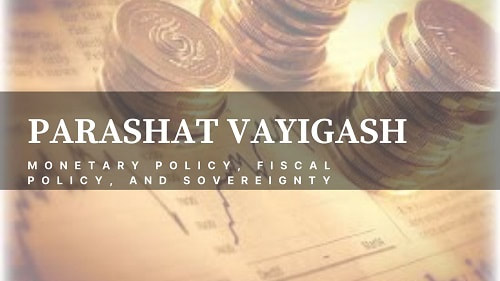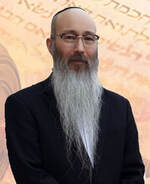|
By: Rabbi Menashe Sasson Reporting from Jerusalem, Israel Parashat Vayigash concludes with the famine in Egypt reaching its climax. As we recall, Yosef had risen to power in Par’o’s Administration; fallen from power and thrown in jail on false charges that had been concocted by the jealous Mrs. Par’o; had once again risen to power after interpreting Par’o’s dreams regarding the seven years of plenty, followed by seven years of famine; and was subsequently elevated to the position of Viceroy, second-in-command of the Par’o Administration, for the purpose of presiding over preparations for, and management of, the famine. Yosef’s responsibilities as Viceroy necessarily included the formulation and implementation of monetary and fiscal policy. “Monetary policy is primarily concerned with the management of interest rates and the total supply of money,” while “[f]iscal policy is a collective term for the taxing and spending actions of governments.” Monetary and Fiscal Policy defined. When the famine became severe, “Yosef gathered up all the money [literally, “כסף,” “silver”] that was found in the land of Misrayim, and in the land of Kena’an, for the corn which they bought. . . .” Bereshit 47:14. In other words, as Viceroy, Yosef managed the total supply of money in Misrayim by acquiring crops, specifically, corn, which was grown in Misrayim during the years of plenty, presumably at low market prices or by nationalization (governmental seizure) of the crops, and then, when the famine struck, sold those crops at high or higher prices. This monetary policy resulted in the masses in Misrayim not having any money. “all of Misrayim came to Yosef and said, ‘Give us bread; for why should we die in thy presence, for there is no money [“אפס כספ,“ literally, “no money” ]?” Bereshit 47:15. The people of Misrayim were desperate. They came and pleaded with Yosef; Yosef responded, “Give me your cattle. . . . And they brought their cattle. . . . Yosef gave them bread in exchange for horses, and for the flocks, and for the herds, and for the asses, and he fed them with bread in exchange for all of their cattle for that year.” Bereshit 47:16-17. The people of Misrayim were still impoverished after the first year of famine. They returned to Yosef during the second year of famine and, in an attempt to mitigate the effects of poverty, offered to sell their land to Par’o and to sell themselves to Par’o as slaves. Yosef purchased their land, but did not accept their offer to purchase them as slaves. Bereshit 47:18-20. Instead of purchasing the people of Misrayim as slaves, Yosef relocated them to parts of the country that were distant from the land that they formerly owned, “[a]s for the people, [Yosef] removed them to the cities from one end of the borders of Misrayim to the other,” Bereshit 47:21, and allowed them to work as sharecroppers, for a fee of twenty percent of what the land produced. “[H]ere is grain for you, and you shall sow the land. And it shall come to pass at harvest times, that you shall give a fifth part to Par’o, and four parts shall be your own. . . .” Bereshit 47:23-24. There are at least three lessons we can learn from the foregoing sections of this Parashat. First, we learn that a person should be very skeptical when a government purports to act as an “ordinary” participant in the marketplace. When “ordinary,” that is, private, non-governmental, persons or entities buy or sell goods or services, we understand that each is acting in his own best-interest and that an economic transaction will occur only if each party to the transaction believes that the transaction will enhance his personal situation. The same is true when a government is a party to a marketplace transaction. However, when a government is a market participant, the situation is fundamentally different because a government, unlike other market participants, gets to make the rules, that is, create the laws. We read in Parashat Miketzh that Yosef “gathered up all of the food of the seven years [of plenty, prior to the famine] which were in the land of Misrayim and laid up the food in the cities [and in the fields].” Bereshit 41:48. The Ramban was of the opinion that Yosef “gathered all the food under his control, and he gave enough of it every year for sustenance to the Egyptians, so that they should not squander it” and that “[i]t is possible that [Yosef] paid them money from the royal treasures at a low market price.” Ramban, Commentary on the Torah, at 507. In other words, Yosef, acting on behalf of the government of Misrayim, either simply nationalized, that is, seized, all of the food that was produced in Misrayim during the seven good years or, alternatively, used the equivalent of what we recognize in modern times as a law of imminent domain to “purchase” the food at very low prices. If the Ramban is correct, the acquisition by Misrayim of food produced during the seven good years was not the result of voluntary market transactions. Even if the Ramban is not correct, the fact that Yosef was able to gather “up all of the food of the seven years” strongly suggests that the government of Misrayim was, in some fashion, manipulating the market for food. We see similar governmental manipulations of markets in contemporary times. For example, most major cities operate mass transit, busses, trains, and the like. Many of those cities also create a governmental monopoly on taxicabs, by requiring the purchase of a limited number of taxicab licenses and, when politically feasible, by outlawing competition from ride-sharing businesses such as Uber and Lyft. Almost always, government officials (and others) attempt to justify these monopoly laws by arguing that the laws are needed to protect the income of the taxicab drivers. “It’s for the benefit of the taxicab drivers and their families,” we are told. What is often missed, however, is that a monopoly on taxicab licenses must inevitably raise the cost of a taxicab ride. When the cost of taxicab rides increase, demand for taxicab rides will decrease because not everyone who would otherwise hire a taxicab is still able or willing to do so. These displaced taxicab customers will then seek alternative – less expensive – forms of transportation. That alternative form of transportation is often government-operated busses and trains. It is no coincidence, of course, that a government which is in the mass transit bus and train business is the same government that enacted laws which create a monopoly for its “competitor” – taxicabs – and which thereby artificially increased the demand for its busses and trains (which, of course, almost never even “break-even,” let alone earn a profit). Second, we learn that most countries today tax their citizens far more than is allowed by Biblical law. We see that Yosef implemented a twenty percent tax on the people of Misrayim. “And it shall come to pass at harvest times, that you shall give a fifth part to Par’o, and four parts shall be your own. . . .“ Bereshit 47:23-24. To “tithe” means to give a portion of one’s income for communal or charitable purposes. The Biblical concept of tithing is, contrary to popular belief, mandatory, not optional. In the context of Tanakh, the purpose of tithes was to raise revenue for community needs. In other words, a Biblical “tithe” is a form of “tax.” Tithing is mentioned in several places in Tanakh. For example, in Parashat Re’e, there is a command that “Thou shalt truly tithe [עשר] all the incense of thy seed that the field brings forth, year by year. And thou shalt eat before the Lord thy G-d, in the place which He shall choose to place His name, the tithe [מעשר] of thy corn, of thy wine, and of thy oil, and the firstlings of thy herds, and of thy flocks. . . .” Debarim 14:22-23. The English transliteration of the Hebrew word “tithe” is “ma'aser” [מעשר]. The three-letter root-word of “מעשר” is “עשר,” which literally means “ten.” The prefix letter “מ” means “from.” Therefore, the word “tithe,” or “ma’aser” means “from ten,” which is usually understood to mean “ten percent.” Thus, we can learn from the Hebrew word “מעשר” that ten percent of one’s income is the minimum tax a person should be required to pay. From the story of Yosef’s taxation of the people in Misrayim, we can learn that twenty percent of one’s income is probably the maximum tax a person should be required to pay. Unfortunately, in most countries today, the total tax a person is required to pay far exceeds twenty percent of their income. Third, we learn that a country should not allow people who erroneously believe that they possess a legitimate claim to real estate to continue occupying that real estate. “As for the people [who sold their land to Par’o, Yosef] removed them to the cities from one end of the borders of Misrayim to the other. . . .” Yosef’s purpose in doing so was to establish Par’o’s undisputed ownership of the land and to impress upon the sellers of the land that they no longer had a claim to their former property. See, Rashi, Radak, Meshech Chocmah. The Talmud relates that Yehoshua cautioned the Jewish People: “Know for what purpose you are crossing the Jordan. It is in order to drive out the inhabitants of the land from before you, as it is stated: ‘And you shall drive out all the inhabitants of the land from before you.’” Masekhet Sotah 34a, citing Bamidbar 33:52. The Jewish People, however, did not comply and were chastised by an angel of the Lord, who said, “you shall make no covenant with the inhabitants of this land; you shall pull down their alters, but you have not obeyed My voice. . . . they shall be as snares to you and their gods shall be a trap to you.” Shofetim 2:2-3. As we continue to see to this very day in Medinat Israel, failure to “drive out all of the inhabitants of the land before you,” that is, to expel from Eretz Israel those who believe their right to possess Eretz Israel is superior to that of the Jewish People, will result in those people being “as snares” and their “gods shall be a trap to” the Jewish People. We don’t need a crystal ball to see the consequences of our actions and inactions; Tanakh will do just fine. Shabbat Shalom! Copyright © The Israel Foundation. All Rights Reserved.
0 Comments
Your comment will be posted after it is approved.
Leave a Reply. |
THE ISRAEL FOUNDATION


